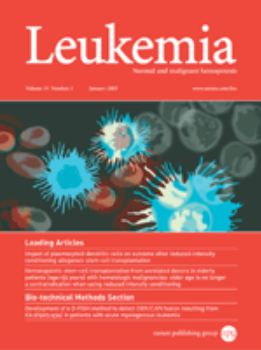Distinct characteristics of VEXAS-causative UBA1 M41 and recurrent functional non-M41 mutations.
IF 13.4
1区 医学
Q1 HEMATOLOGY
引用次数: 0
Abstract
VEXAS (vacuoles, E1 enzyme, X-linked, autoinflammatory, somatic) syndrome is a severe inflammatory and hematologic disease caused by somatic mutations in UBA1. Canonical pathogenic mutations at UBA1 p.Met41 (M41) lead to the loss of the cytoplasmic isoform (UBA1b), while non-canonical mutations outside of M41 (non-M41) result in reduced activity of both nuclear and cytoplasmic isoforms. Studies have reported clinical differences between canonical and non-canonical mutations, but these findings are constrained by small sample sizes and scarcity of genetic studies. In our study, we screened 29,000 individuals for UBA1 variants, referred for a broad range of hematologic diseases, and subjected to 62-gene panel sequencing, identifying 232 patients carrying likely disease-causing mutations. We identified decreased polyubiquitylation in all of the 18 UBA1 variants tested and found differences in H2A/B monoubiquitylation alteration between M41 and non-M41 mutations. Our findings confirm that patients harboring M41 mutations present at most with myelodysplastic neoplasms (MDS) and suggest that M41 mutations generally do not tolerate multiple co-mutations. In contrast, non-M41 mutations are more likely to appear with co-mutations and are detected in patients with hematologic neoplasms other than MDS. Our study establishes that M41 and non-M41 mutations exhibit distinct clinical and biological phenotypes, significantly enhancing UBA1 variant interpretation.引起vexas的UBA1 M41和复发性功能性非M41突变的独特特征。
VEXAS(液泡,E1酶,x连锁,自身炎症,躯体)综合征是由UBA1体细胞突变引起的严重炎症和血液学疾病。UBA1 p.Met41 (M41)的典型致病突变导致细胞质异构体(UBA1b)的丢失,而M41外的非典型突变(non-M41)导致核和细胞质异构体的活性降低。研究报告了典型和非典型突变之间的临床差异,但这些发现受到样本量小和遗传研究稀缺的限制。在我们的研究中,我们筛选了29,000人的UBA1变异,涉及广泛的血液学疾病,并进行了62个基因面板测序,确定了232名携带可能致病突变的患者。我们在所有18个测试的UBA1变异中发现多泛素化降低,并发现M41和非M41突变之间H2A/B单泛素化改变的差异。我们的研究结果证实,携带M41突变的患者大多患有骨髓增生异常肿瘤(MDS),并表明M41突变通常不能耐受多种共突变。相比之下,非m41突变更可能与共突变一起出现,并且在MDS以外的血液肿瘤患者中检测到。我们的研究证实M41和非M41突变表现出不同的临床和生物学表型,显著增强了UBA1变异的解释。
本文章由计算机程序翻译,如有差异,请以英文原文为准。
求助全文
约1分钟内获得全文
求助全文
来源期刊

Leukemia
医学-血液学
CiteScore
18.10
自引率
3.50%
发文量
270
审稿时长
3-6 weeks
期刊介绍:
Title: Leukemia
Journal Overview:
Publishes high-quality, peer-reviewed research
Covers all aspects of research and treatment of leukemia and allied diseases
Includes studies of normal hemopoiesis due to comparative relevance
Topics of Interest:
Oncogenes
Growth factors
Stem cells
Leukemia genomics
Cell cycle
Signal transduction
Molecular targets for therapy
And more
Content Types:
Original research articles
Reviews
Letters
Correspondence
Comments elaborating on significant advances and covering topical issues
 求助内容:
求助内容: 应助结果提醒方式:
应助结果提醒方式:


